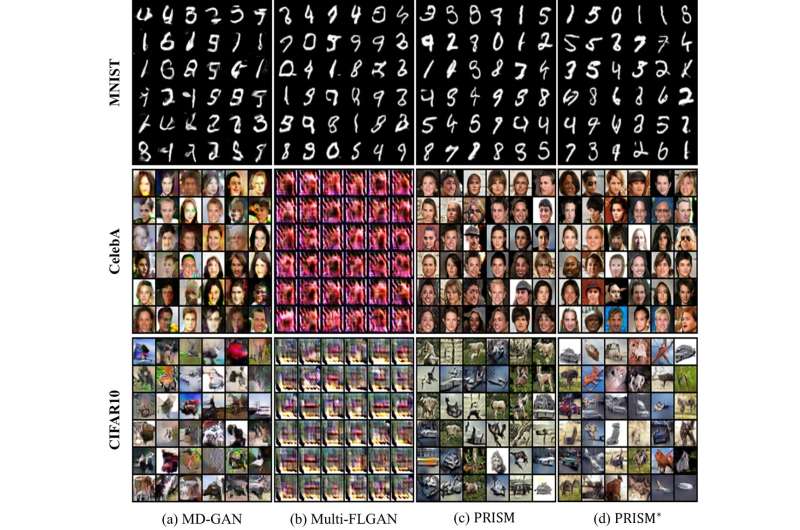
A new super-lightweight artificial intelligence (AI) model has been created to help create top-notch images without sending any sensitive data directly to servers. This technological leap forward opens doors for secure use of powerful generative AI in settings where privacy is crucial, such as analyzing patient MRI and CT scans.
Professor Jaejun Yoo’s research team at UNIST’s Graduate School of Artificial Intelligence has introduced PRISM (PRivacy-preserving Improved Stochastic Masking), a federated learning AI model. The results have been published on the arXiv preprint server.
Federated learning (FL) is a method that enables building a global AI by combining outcomes from individual device’s local AI after learning without the need to upload confidential information straight to the server.
PRISM functions as an AI model that serves as an intermediary connecting local AI with global AI during the federated learning process. This model cuts down communication costs by about 38% in comparison to current models, and its size is trimmed to a 1-bit level, enabling efficient operation on the CPUs and memory of small gadgets like smartphones and tablets.
Furthermore, PRISM accurately determines which local AI information to trust and integrate, even in circumstances where substantial data and performance differences exist among various local AIs, leading to exceptional output quality.
For example, when converting a selfie into a Studio Ghibli-style image, prior methods necessitated uploading the photo to a server, posing potential privacy concerns. With PRISM, all processing happens on the smartphone, safeguarding personal privacy and delivering speedy results. Nonetheless, it’s crucial to understand that developing the local AI capable of generating images on the smartphone is a separate requirement.
Experiments on frequently used datasets for validating AI performance, including MNIST, FMNIST, CelebA, and CIFAR10, indicated that PRISM not only reduced communication volume but also produced superior image generation quality compared to traditional methods. Particularly, additional experiments using the MNIST dataset affirmed compatibility with diffusion models predominantly employed for generating Studio Ghibli-style images.
The research team boosted communication efficiency by using a stochastic binary mask technique that selectively shares only essential information rather than extensive parameter sharing. Additionally, the use of Maximum Mean Discrepancy (MMD) for precise assessment of generative quality and Mask-Aware Dynamic Aggregation (MADA) strategies that combine contributions from each local AI differently helped alleviate data inconsistencies and training instability.
Professor Yoo mentioned, “Our approach can be extended not only to image generation but also to text generation, data simulation, and automated documentation, making it a reliable and secure solution in fields dealing with sensitive information, such as healthcare and finance.”
This study was a collaboration with Professor Dong-Jun Han from Yonsei University, with UNIST researcher Kyeongkook Seo serving as the first author.
The research results will be presented at the thirteenth International Conference on Learning Representations (ICLR 2025) taking place from April 24 to 28 in Singapore.
More information:
Kyeongkook Seo et al, PRISM: Privacy-Preserving Improved Stochastic Masking for Federated Generative Models, arXiv (2025). DOI: 10.48550/arxiv.2503.08085

